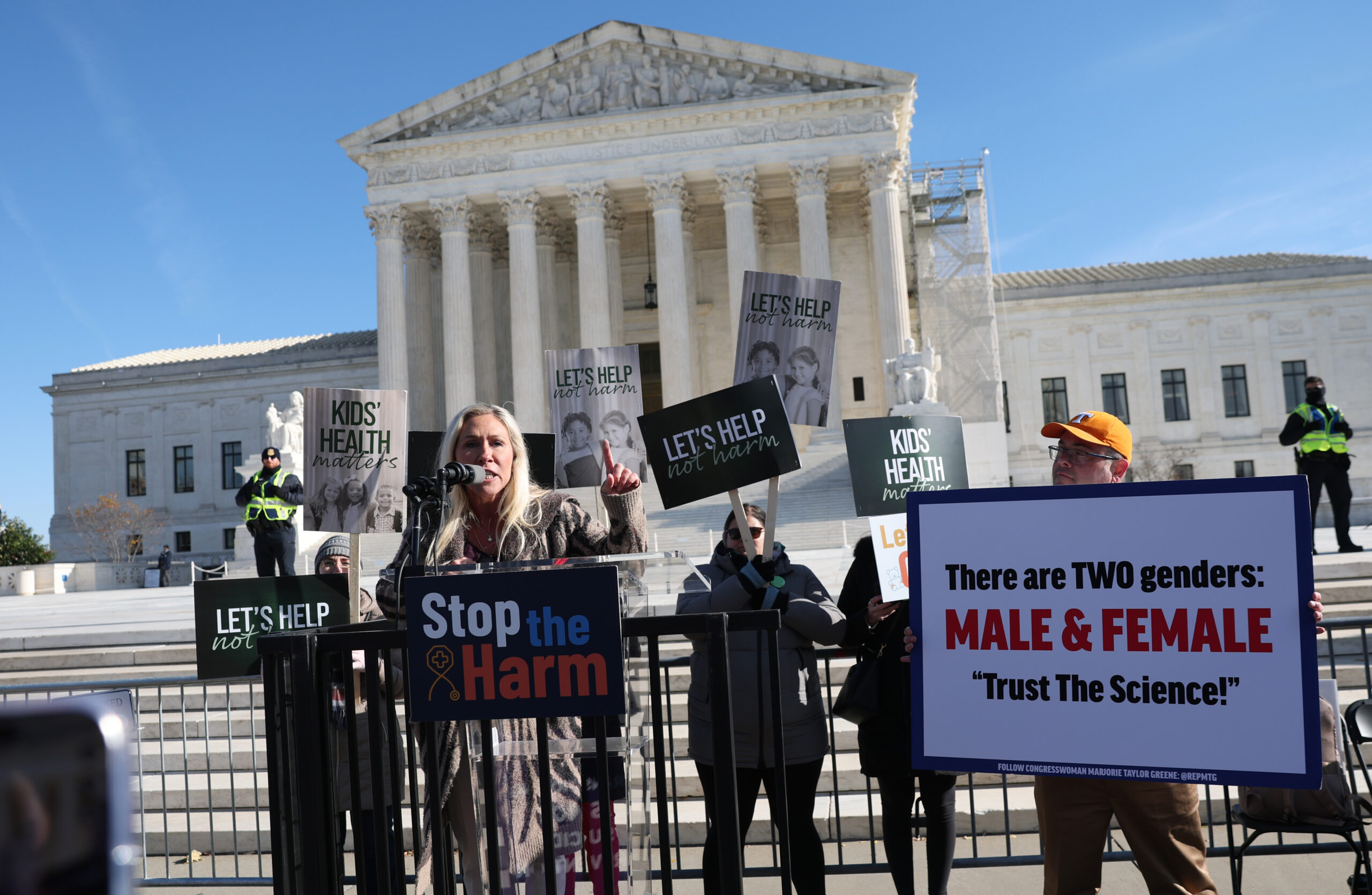The Supreme Court on Wednesday upheld a Tennessee law that bars minors from undergoing medical treatments to develop secondary sex characteristics of the opposite sex. The landmark ruling deals a bruising blow to the transgender rights movement, which in recent years has placed advocating for and protecting children’s access to gender-transition medications at the forefront of its increasingly demoralized civil-rights mission.
The decisive, 6-3 ruling in the case, known as U.S. v. Skrmetti, is expected to solidify all the similar bans that Republicans have passed in half of U.S. states, some of which have been blocked by lower courts. This will dramatically narrow the availability to adolescents of these controversial and politicized medical interventions – which include the use of puberty blockers and cross-sex hormones.
Supporters of such treatments have argued that they are safe and effective at relieving mental health struggles among youth who suffer from gender-related distress. Skeptics and opponents, on the other hand, have pointed to systematic reviews of the evidence backing these treatments that have found the science wanting and inconclusive. These groups have also highlighted potential harms of the treatment, including infertility and the possibility that youth will later regret undergoing treatment with certain irreversible impacts on the body.
In a statement, Kristen Waggoner, the president and CEO of Alliance Defending Freedom, the conservative legal group that has been a leader in litigating against LGBTQ rights, such as in the 2017 Supreme Court case over whether a cake maker could refuse to serve a gay couple, celebrated the ruling. She said that upholding Tennessee’s law “would have forced states to base their laws on ideology, not evidence—to the immense harm of countless children. The court’s rejection of that request is a monumental victory for children, science, and common sense. States are free to protect children from the greatest medical scandal in generations.”

The court’s decision, however monumental, will not necessarily have sweeping implications for transgender-related litigation more broadly, according to Doriane Lambelet Coleman, a law professor at Duke University and the author of On Sex And Gender: a Commonsense Approach. She said that the court has left as an open question whether transgender people should be recognized as a protected class, for whom a higher level of legal scrutiny under the 14th amendment is warranted.
In a statement, the ACLU, which originated the lawsuit over the Tennessee ban, asserted that “the decision is based on the record in and context of the Tennessee case and therefore does not extend to other cases concerning discrimination based on transgender status.”
Chase Strangio, co-director of the ACLU’s LGBTQ and HIV Project, said in the statement: “Today’s ruling is a devastating loss for transgender people, our families, and everyone who cares about the Constitution. Though this is a painful setback, it does not mean that transgender people and our allies are left with no options to defend our freedom, our health care, or our lives. The Court left undisturbed Supreme Court and lower court precedent that other examples of discrimination against transgender people are unlawful.”
The Skrmetti ruling, for which the Supreme Court’s six conservative members comprised the majority, the justices ruled that another landmark Supreme Court decision, Bostock v. Clayton County did not alter their thinking. Justice Neil Gorsuch wrote for the majority in that 2020 case that Title VII of the 1964 Civil Rights Act barred employment discrimination based on gender identity and sexual orientation because it’s impossible to discriminate on these bases without taking a person’s sex into account. Liberal litigators, including at the ACLU, have in Skrmetti and other cases sought to expand transgender civil rights by applying the court’s reasoning in Bostock in various other contexts.

In examining the Tennessee law, the court grappled with a constitutional rather than a statutory question. The justices sought to determine whether the state’s law barring minors from receiving gender-transition treatments was sex discrimination that violated the 14th Amendment’s Equal Protection clause.
The Biden Justice Department, which represented the plaintiffs challenging the State of Tennessee —three transgender adolescents from Tennessee, their parents and a doctor—argued that the Bostock reasoning applied to the equal-protection question. And in what was considered a Hail Mary attempt, they argued separately that transgender people were a protected class under constitutional law.
The Trump Administration in February switched sides in the case. But given the administration’s eagerness to have the matter resolved by the nation’s highest court – amid the aggressive moves by Mr. Trump, among others, to restrict medical gender treatments for minors nationally; bar biological men from playing women’s and girls’ sports; and reject the premise that there are more than two genders – the Justice Department did not withdraw its predecessor’s original complaint.
This particular legal matter is now resolved: the Equal Protection clause does not bar states from banning these treatments for minors, and the treatments are likely to remain available, for the most part, only in states controlled by Democrats. But similar to its strong-armed approach to universities, the Trump Administration is wielding its financial leverage to force change even within blue states. Last week, the Children’s Hospital of Los Angeles announced it was closing its pediatric gender clinic, saying the potential of the Administration pulling all its Medicaid funding had posed an existential threat to the entire hospital.
The Decision: a Bruising Loss for the Plaintiffs
Writing for the majority, Chief Justice Roberts ruled that the Tennessee ban on gender-transition drugs for minors did not violate the Equal Protection clause because the application of the law, called SB1, “does not turn on sex.”

Justice Roberts wrote that the “fierce scientific and policy debates about the safety, efficacy and propriety of medical treatments in an evolving field” should be resolved not by the courts but are “appropriately left to the people, their elected representatives, and the democratic process.” He noted that the 2006 decision in Gonzales v. Carhart – concerning bans of late-term abortions – indicated that states have “wide discretion to pass legislation in areas where there is scientific and medical uncertainty.”
In a statement, Alabama Attorney General Steve Marshall, who has waged a vigorous defense of his deep red state’s ban on pediatric gender medicine, said: “Until a few years ago, the notion of providing sex-change procedures to children was practically unthinkable. So was the idea that the judiciary is the best branch to sort through the evidence and decide that kids suffering from gender-related psychological distress must be allowed to take powerful hormones that risk permanently changing their bodies and leaving them sterilized.”
In keeping with the court’s historical and steadfast reluctance to add new protected classes—it declined to do so when it legalized gay marriage in 2015, and has refused to recognize disability as a protected class, for example—the majority decision did not designate trans people as members of such a class.
Justice Roberts was joined by the five other members of the court’s conservative super majority, with some filing concurring opinions.

In her concurring opinion, Justice Barrett – whose status as the reliably conservative vote Trump hoped for has come under increasing scrutiny – effectively reasserted her conservative bona fides by writing that transgender status is not a protected class, in part because of its mutability, given that some people detransition, meaning they revert to identifying and presenting as their biological sex.
“Nor is the transgender population a ‘discrete group,’” as required to be recognized as a protected class, Justice Barrett wrote. “Instead,” she continued, “like classes we have declined to recognize as suspect, the category of transgender individuals is ‘large, diverse, and amorphous.’”
Addressing the question of Bostock’s application outside of employment contexts, the majority found that the law “does not alter the court’s analysis.” To assess for discrimination barred by the statute, that 2020 decision applied a test in which changing the person’s sex would change the outcome of the dispute. But in the case of the Tennessee ban, the court found that this test did not, in fact, change the outcome; children would still be banned from receiving drugs for the purpose of transitioning their gender if they were the opposite sex.
However, the court issued a notably restrained ruling in this context, declining to address whether Bostock’s reasoning “reaches behind the Title VII context.” This should limit the reach of this decision.
“Lawyers working to secure trans rights can continue to use Bostock based reasoning where the language of the law allows it,” Ms. Coleman said.
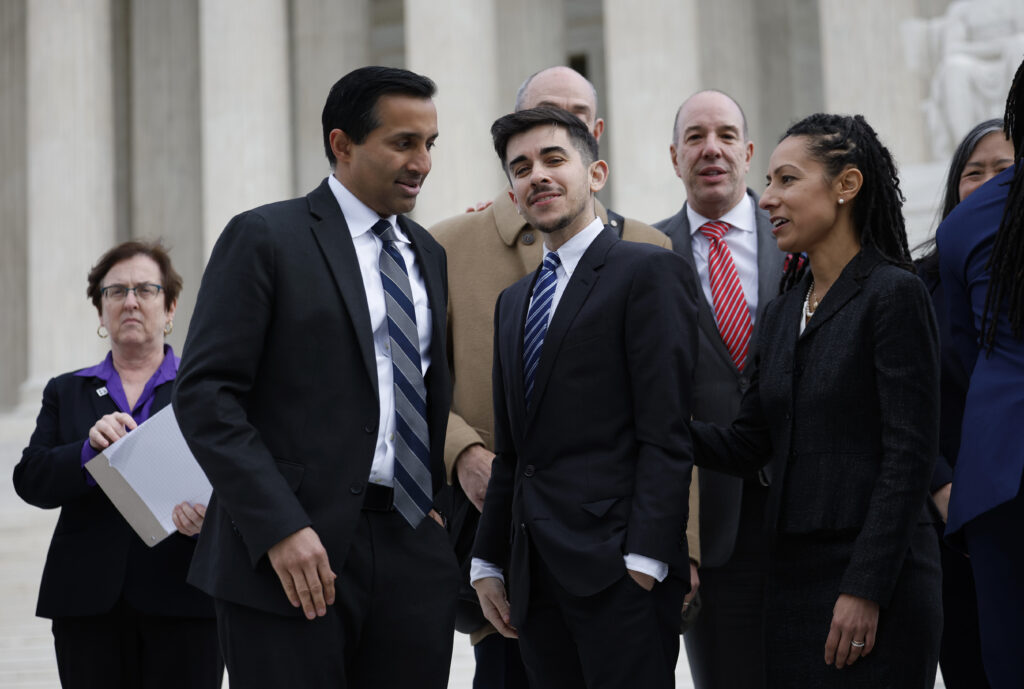
Justice Sotomayor authored the dissent on behalf of the court’s three-person liberal block, which she read from the bench, expressing her “sadness” over the majority’s decision. Justice Jackson joined the dissent in full. Justice Kagan joined for part of the dissent and also filed a dissenting opinion of her own.
The ACLU originated the suit against Tennessee over the law, which Tennessee Governor Bill Lee, a Republican, signed in 2023. The 6th Circuit Court of Appeals found that the law violated neither equal-protection nor due-process rights. The Supreme Court then declined to accept the ACLU’s complaint, which focused on both these concerns. Instead, it accepted the Biden Justice Department’s separate complaint, which posed only the equal-protection question. The court nevertheless permitted the ACLU to present oral argument. This led to the ACLU’s Chase Strangio to become the first openly transgender person to give oral argument before the Supreme Court.
During oral arguments in December, Biden’s solicitor general, Elizabeth B. Prelogar, and Mr. Strangio, argued that the Tennessee law discriminated on the basis of sex because children in the state who were not transgender could still receive puberty blockers and sex hormones while trans minors could not. Given that sex is considered a protected class under constitutional law, a ruling agreeing with this argument would have warranted a higher level of legal scrutiny to determine whether the law was unconstitutionally discriminatory.
Tennessee’s solicitor general, Matthew Rice, countered that the law discriminated based not on sex, but on medical condition and age, neither of which are protected classes under the 14th Amendment.
The court’s majority agreed with the state’s argument.
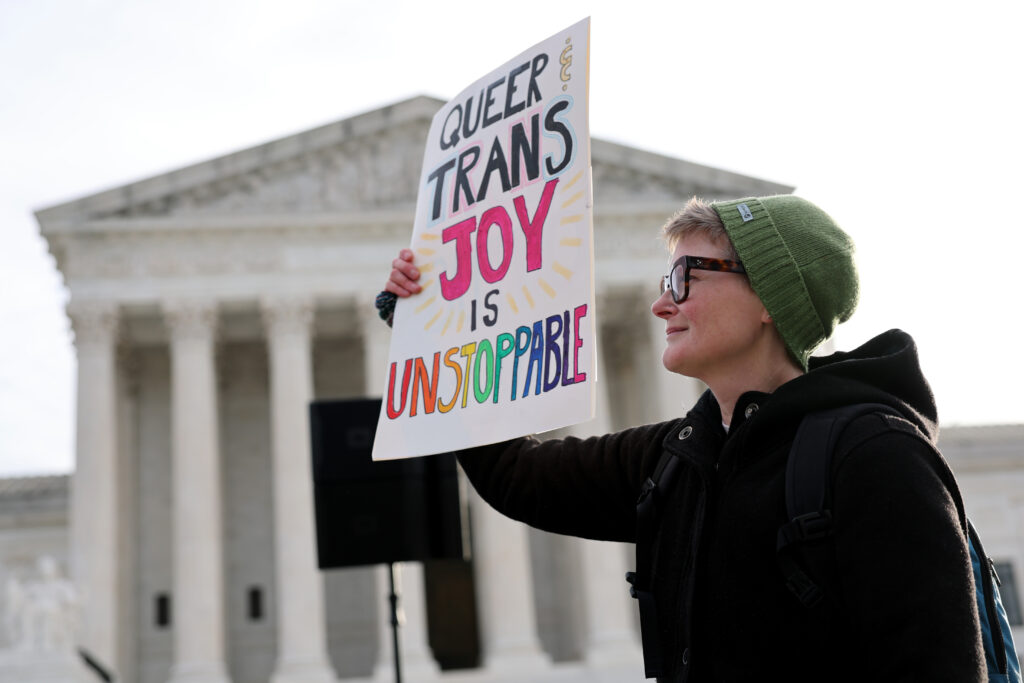
Justice Roberts relied in particular on a pivotal 1974 case, Geduldig v. Aiello, which concerned a California insurance program that excluded from coverage certain pregnancy-related disabilities. The court ruled in that case, the chief justice recounted, that “though only biological women can become pregnant, not every legislative classification concerning pregnancy is a sex-based classification.” The insurance policy, the court ruled in Geduldig, discriminated based on the medical condition of pregnancy, not sex. And absent using pregnancy as a mere pretext to discriminate against one sex or another, lawmakers could exclude pregnancy from medical coverage, just as with any other medical condition.
“By the same token,” Mr. Roberts wrote, “SB1 does not exclude any individual from medical treatments on the basis of transgender status. Rather, it removes one set of diagnoses—gender dysphoria, gender identity disorder, and gender incongruence—from the range of treatable conditions.” He further wrote that the law “permits providers to administer puberty blockers and hormones to minors of any sex for other purposes.”
Given that the court ruled that SB1 did not discriminate based on sex, the law only needed to clear a low bar, known as rational basis review: to determine whether it was rationally related to a legitimate state interest and was not arbitrary and capricious. The court’s majority found that it did pass such muster.
Despite language in the Tennessee law asserting that its purpose was, in part, to encourage young people to “appreciate” their biological sex, the court rejected the Biden administration’s argument that, Justice Roberts wrote, “by design, SB1 enforces a government preference that people conform to expectations about their sex.” The law would not warrant heightened legal scrutiny, he wrote, “unless it was motivated by an invidious discriminatory purpose. No such argument has been raised here. And regardless, the statutory findings on which SB1 is premised do not themselves evince sex-based stereotyping.”
A Gender-Identity Sea Change Meets a Wall of Political Pushback
The Supreme Court ruling in the Skrmetti case is expected to swiftly entrench as a matter of settled law state bans on gender-transition medications for minors, which since 2021 have passed in 25 Republican-led state legislatures. New Hampshire appears poised to join them as the 26th state. The case before the court did not concern gender-transition surgeries, which are banned in all 26 of those states plus Arizona. Alaska is now the only red state with no such bans.

“Today the Supreme Court told Tennessee transgender youth and their families that they cannot access healthcare that is vitally important for a successful life,” Lucas Cameron-Vaughn, senior staff attorney at the ACLU of Tennessee, said in a statement. “This ruling creates a class of people who politicians believe deserve healthcare, and a class of people who do not.”
However, it is possible that lawsuits that complain these state laws violate due-process rights, in particular the rights of parents to make medical decisions for their children, might still persist. This might in turn lead to conflicting rulings in the lower courts, including injunctions blocking some of the state laws, and then prompt the Supreme Court to revisit the subject.
Statehouse Republicans began their campaign to pass these laws amid a sea change on the left about how gender is defined. The political controversies started with efforts by Republican lawmakers in the mid-2010s to pass state laws barring transgender people from the bathrooms that fit their gender identities. In recent years the fiercest debates have focused on the medical gender treatments for minors, an issue on which many conservatives have drawn a red line.
Since around 2012, transgender identification and diagnoses of gender dysphoria—a medically recognized psychiatric condition involving distress stemming from a conflict between a person’s sex and gender identity—have surged among adolescents and young adults, while remaining stable among older populations. A recent Centers for Disease Control and Prevention survey found that 3.3 percent of high school students identify as transgender. According to an analysis by the Manhattan Institute, a conservative estimate of 320,000 to 400,000 minors were diagnosed with gender dysphoria between 2017 and 2023.

The profile of the typical child presenting at a pediatric gender clinic has also changed dramatically. Before the mid-2010s, gender dysphoria in children was very rare and usually occurred among biological boys starting at a very young age. Today, the majority of patients at these clinics are biological girls who only began expressing a cross-sex identification after puberty’s onset. The population now also has markedly high rates of other psychiatric conditions and autism.
Skeptics of the treatments have accused the pediatric gender medicine field of failing to observe proper guardrails in prescribing gender-transition treatments and effectively rushing children onto these drugs absent thorough psychological assessment. They have characterized gender dysphoria as driven, at least in part, by social contagion. A 2024 lawsuit revealed that Boston Children’s Hospital, which was the first, in 2007, to launch the use of pediatric gender-transition treatment in the United States, had since 2018 provided children seeking these medications with only a single two-hour assessment appointment with a psychologist before the gender clinic decided whether to refer them to an endocrinologist.
The precise number of minors who have received gender-transition treatment is hard to come by. But a recent paper estimated that among those with private health insurance, about 1 in 1,000 minors were taking cross sex hormones by age 17. This rate was higher than that among biological girls and was likely higher overall by the end of the study period, which spanned 2018 to 2022 – a period that apparently saw considerable growth in the prescription of these drugs to minors.
Advocates of pediatric gender medicine have held up such figures as evidence that Republicans, in an effort to exploit a wedge issue for political gain, have cynically stewed a moral panic over medical practices used by only a tiny group of vulnerable children. Such advocates have also been keen to fault conservative-leaning media for paying what they characterize as outsize attention to transgender issues.

Conservatives have their own criticisms of the liberal-leaning media and advocacy groups: for insisting on using the term “gender-affirming care” as a term for gender-transition treatment, which the right characterizes as propaganda; and for sweepingly portraying opponents or skeptics of these treatments as hate groups.
In a Congressional hearing earlier this month, Democratic Representative Pramila Jayapal, Democrat of Washington, a member of Alexandria Ocasio Cortez’s progressive “Squad,” who has a transgender child, denounced Republicans for interfering with parents’ decisions about their children’s medical care. Gender-transition medical interventions, she asserted, are only provided to a small minority of transgender children.
According to an estimate by the Manhattan Institute, approximately 6,000 minor natal girls underwent double mastectomies for gender dysphoria between 2017 and 2013.
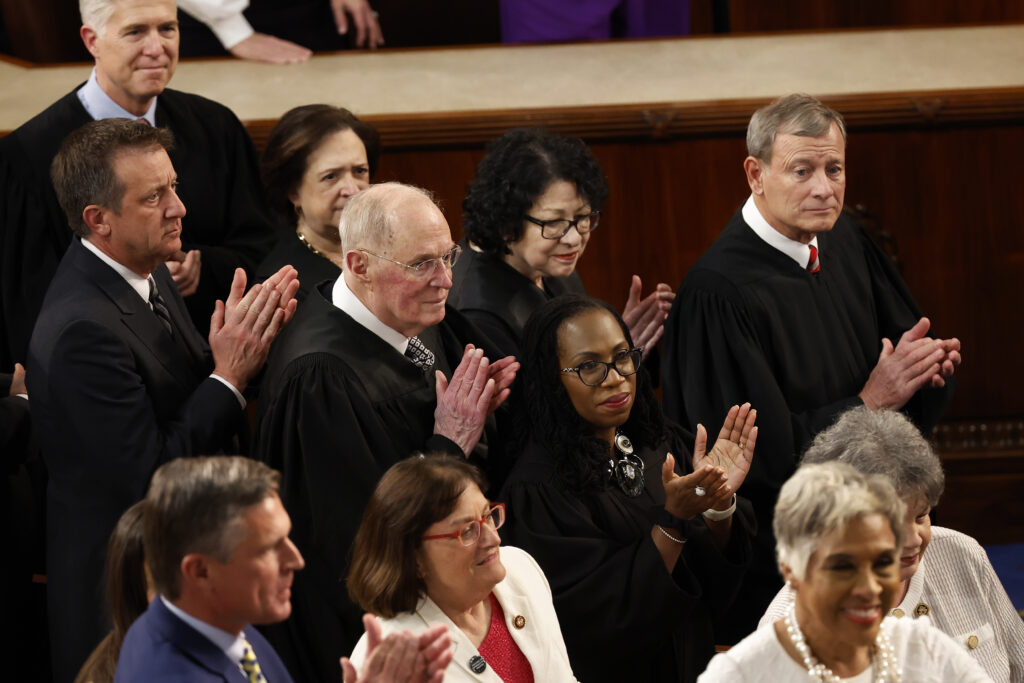
Many transgender advocates, however, have a history of expressing concern, irrespective of state bans, that far too few children have had access to gender-transition drugs. The World Professional Association for Transgender Health, or WPATH, a leading activist-medical group that publishes the trans-care guidelines that form the backbone of this medical field in the United States, suggested in a statement last year that the majority of children with a transgender identity would fare better by undergoing a medical transition.
In a civil case in Alabama over its ban of these treatments, the state’s attorney general, Mr. Marshall, subpoenaed documents from WPATH that have sustained serious damage to the organization’s reputation. Internal emails indicated that leaders in the organization were aware that the evidence base supporting gender-transition treatments for minors was thin and that the leaders sought to paper this over. Earlier this month, the judge in that case authorized the release, still pending, of hundreds hours of subpoenaed videos from a three-year span of WPATH’s annual conference, which the organization keeps strictly closed to outside eyes.
Gary Click, a Republican state representative in Ohio who marshaled that state’s bill banning these treatments, told the Sun in an email, “The accusation that we ‘exploit for political gain’ is a backhanded way of saying that we listen to our constituents and advocate for what they want. Isn’t that our job? In contrast, not a few Democrats refused to support the bill for political reasons. Behind closed doors they said, ‘Thank you.’”
The Ruling’s Implications
Going forward, the availability to minors of gender-transition drugs will likely resemble the state-by-state patchwork of abortion-rights laws.
But even in blue states, including those with sanctuary laws, access by gender-dysphoric minors to puberty blockers, cross-sex hormones and gender-transition surgeries is far from guaranteed, given the Trump administration’s whole-of-government assault on pediatric gender medicine. Through a fusillade of executive orders, proposed legislation, and the might and muscle of multiple federal agencies, the administration has sought to undo not just this entire medial field, but the very notion that transgender identities can and should exist and be recognized in any capacity by the law, public schools, the military or society at large.
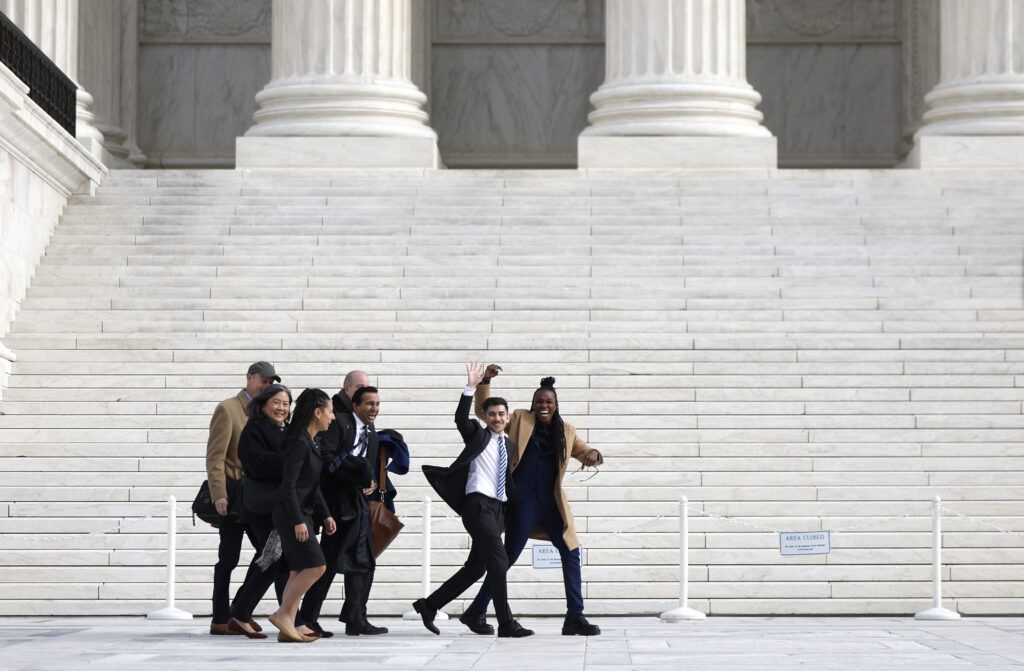
Joseph Figliolia, a policy analyst who studies pediatric gender medicine at the Manhattan Institute, said of the Trump Administration’s efforts to shut down this field nationwide, “They’re definitely going to use the power of the federal government to try to enforce the kind of regulations they want and just hang threats over people’s heads.”
A White House executive order issued in January sought to forbid federal funding to health care providers that provided gender transition interventions to anyone under age 19. Accordingly, multiple prominent hospitals, including the Los Angeles children’s hospital, promptly at least paused their pediatric gender medicine programs. But two federal judges have since blocked the order pending litigation against it.
In April, Attorney General Bondi directed prosecutors to investigate doctors who have provided gender-transition surgeries to minors.
Last month, the Department of Health and Human Services secretary, Robert F. Kennedy, Jr., sent a letter to U.S. healthcare providers urging them to cease following WPATH’s guidelines on pediatric gender-transition treatment and instead to consider such interventions risky and harmful. The same day, Dr. Mehmet Oz, director of the Centers for Medicaid and Medicare Services and former daytime TV star and GOP Senate candidate, sent a letter to providers requesting documentation about their pediatric gender-care services, including their efforts to change clinical practice guidelines in keeping with Kennedy’s characterization of these treatments.
This month, the FBI’s X account posted a request for tips “of any hospitals, clinics, or practitioners performing these surgical procedures on children,” despite the fact that gender-transition surgeries remain legal for minors in 23 states.
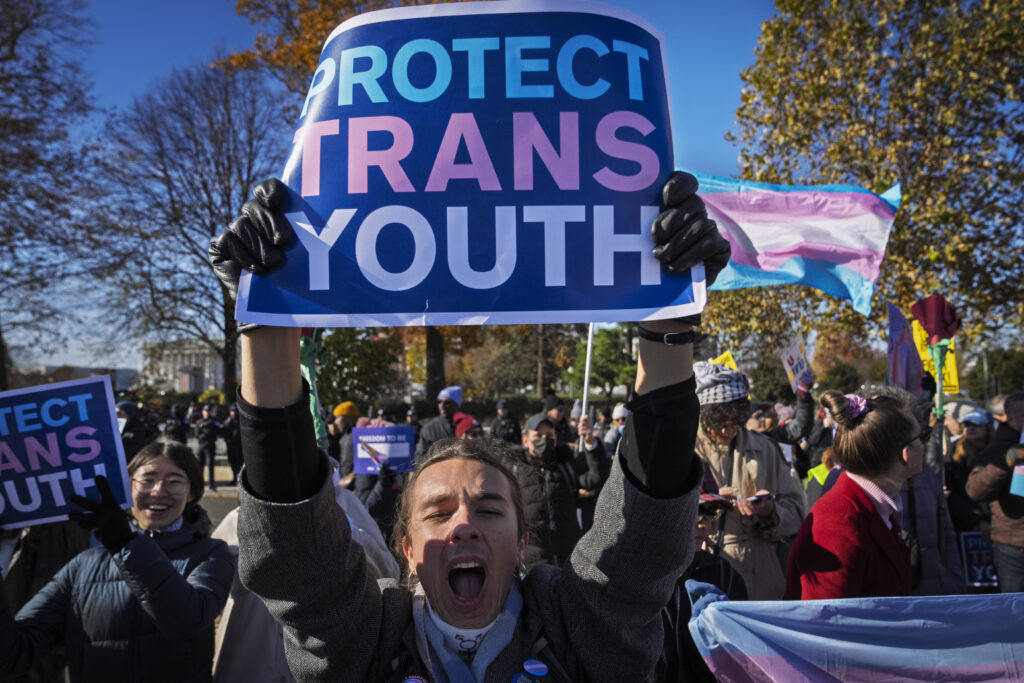
Next month, the Federal Trade Commission will hold a daylong workshop in an effort to characterize the field of pediatric gender medicine as promoting “unfair and deceptive trade acts.”
Meanwhile, the budget reconciliation bill passed by the House and now in the hands of the Senate would eliminate Medicaid coverage for gender-transition drugs and surgeries not just for minors, but for adults as well.
In May, HHS published a lengthy commissioned report on pediatric gender medicine. Relying in part on a so-called “umbrella review” of multiple systematic literature reviews—the gold standard of scientific evidence—the report concluded that the evidence base to support this field is woefully inadequate.
Health authorities across Scandinavia and in the United Kingdom have reached similar conclusions about the scientific evidence based on systematic reviews. But unlike in Republican-led U.S. states, these nations have not fully banned minors’ access to gender-transition drugs; rather they have sharply restricted access, in some cases to clinical trials only.
In the United States, pediatric gender-transition treatment remains supported by a wide swath of major medical organizations, save, notably, the American Society of Plastic Surgeons.
The HHS report, which has been widely criticized for keeping its authors’ identities secret, argued that the potential harms of these drugs, in particular the potential loss of fertility, are so serious that pediatric gender-transition treatments should not even be studied in clinical trials.
(Except for the headline, this story has not been edited by PostX News and is published from a syndicated feed.)

